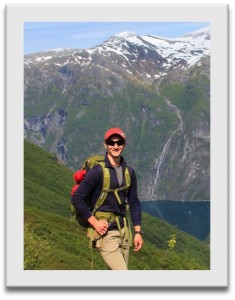 Jamie Cutts
Jamie Cutts
PhD student
University of British Columbia
I am a Ph.D. candidate in the department of Earth, Ocean, and Atmospheric Sciences at the University of British Columbia. My research career thus far has been focussed on using various geochronological techniques to constrain the timing and duration of processes involved during orogenesis (mountain building). This research interest first began with a B.Sc honours project investigating ophiolite emplacement in the Newfoundland Appalachians. I followed this up with an M.Sc that involved dating and characterizing a suite of syn-tectonic plutons that were emplaced during the height of orogenesis in the Grenville Province of Ontario.
My PhD research began in January 2015 under the supervision of Drs. Matthijs Smit and James Scoates and is focussed on constraining the rate at which a terrane of continental crust in Norway was subducted to mantle depths during the Caledonian orogeny and also to determine how quickly it was exhumed. This field site acts as an ancient proxy for what may be occurring deep in the Himalayas. My research uses two relatively recent chronologic techniques, Lu-Hf garnet geochronology and micro-analytical U-Pb rutile geochronology; preliminary results are so far indicating striking similarities between the Himalayas and my field site. Another aspect of my research involves using the Lu-Hf garnet method as an ultra-high temperature thermo-chronometer to study orogenic peridotites in the Western Gneiss Complex. These fragments of the mantle have a protracted history spanning ~3 billion years and although these rocks have been extensively studied, the advent of the Lu-Hf technique has the potential to reveal an entirely new history for these remarkable rocks.
Doing a graduate degree is not only about research but should also strive to build a network and a skill-set that will follow you throughout your career. MAGNET has been a remarkable in enabling travel to workshops and conferences, providing a unique environment to improve our teaching skills, and above all has connected a diverse group of researchers across the country that can benefit from each other’s expertise and knowledge.
Blog: http://geoarchaeo.com/
Last updated May 2018


 Catherine Armstrong
Catherine Armstrong Laura Bilenker
Laura Bilenker Priyanka Chandan
Priyanka Chandan Carol Cheyne
Carol Cheyne June Cho
June Cho Sarina Cotroneo
Sarina Cotroneo Jamie Cutts
Jamie Cutts Fiona D'Arcy
Fiona D'Arcy Ashley Davidson
Ashley Davidson Nicolas Estrade
Nicolas Estrade Anaïs Fourny
Anaïs Fourny Evelyn Frères
Evelyn Frères Elizabeth King
Elizabeth King Alexander Lemieux
Alexander Lemieux Miling Li
Miling Li Marc-Antoine Longpré
Marc-Antoine Longpré Gregor Lucic
Gregor Lucic Kalina Malowany
Kalina Malowany Eduardo Mansur
Eduardo Mansur Jill McDermott
Jill McDermott Rhy McMillan
Rhy McMillan Aleksandra Mloszewska
Aleksandra Mloszewska Nichole Moerhuis
Nichole Moerhuis Emily Mullen
Emily Mullen Genna Patton
Genna Patton Jean-David Pelletier
Jean-David Pelletier Elizabeth Phillips
Elizabeth Phillips Nabila Rahman
Nabila Rahman Lindsay Reynolds
Lindsay Reynolds Luiz Felipe Salim Amaral
Luiz Felipe Salim Amaral Cheyenne Sica
Cheyenne Sica Elliott Skierszkan
Elliott Skierszkan Kate Smith
Kate Smith Natalie Szponar
Natalie Szponar Victoria Tweedie
Victoria Tweedie Tom Ver Hoeve
Tom Ver Hoeve Clara Waelkens
Clara Waelkens Nicole Williamson
Nicole Williamson Anne Wozney
Anne Wozney Wang Zheng
Wang Zheng


 Site by Sprout Creative
Site by Sprout Creative